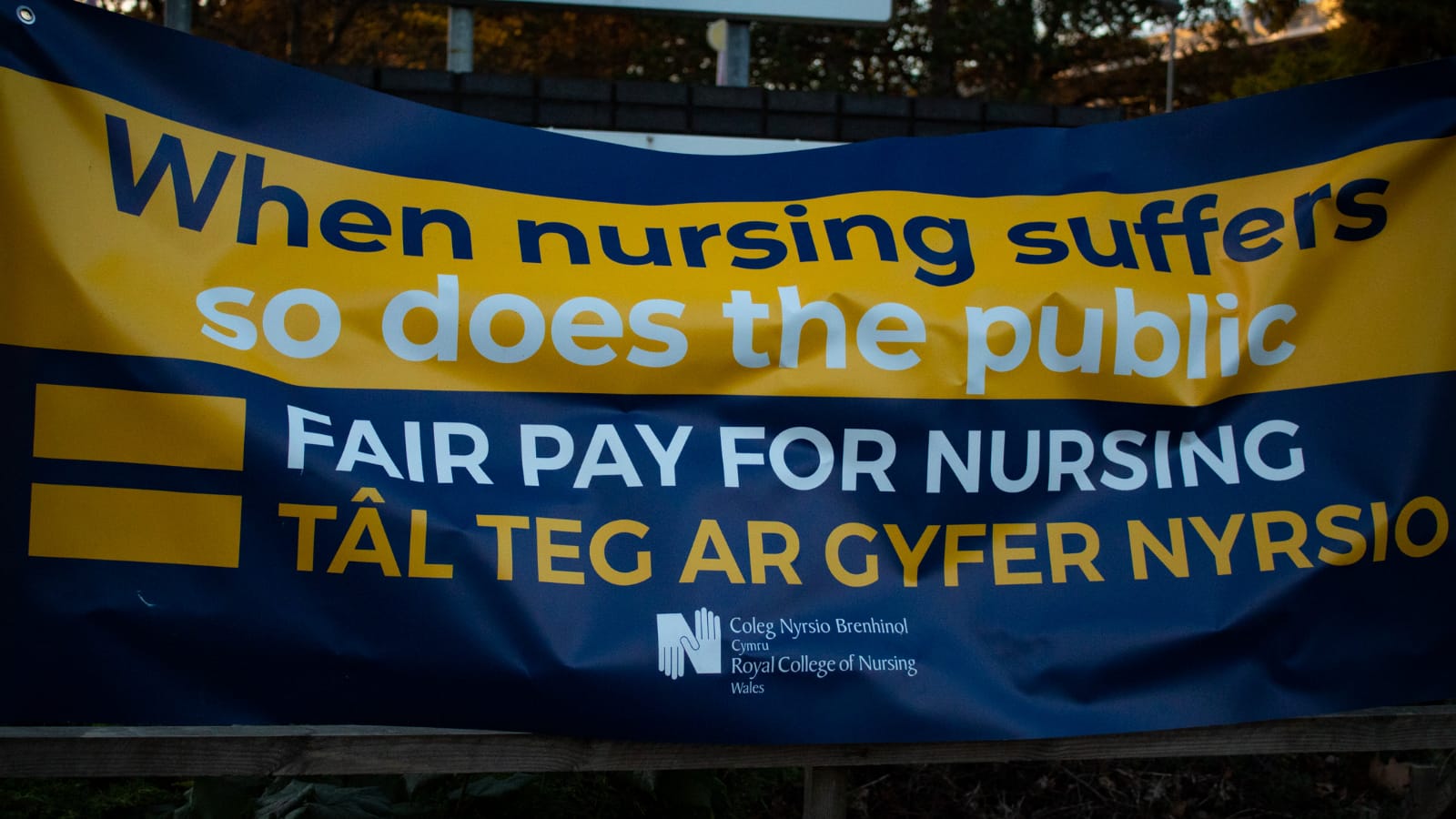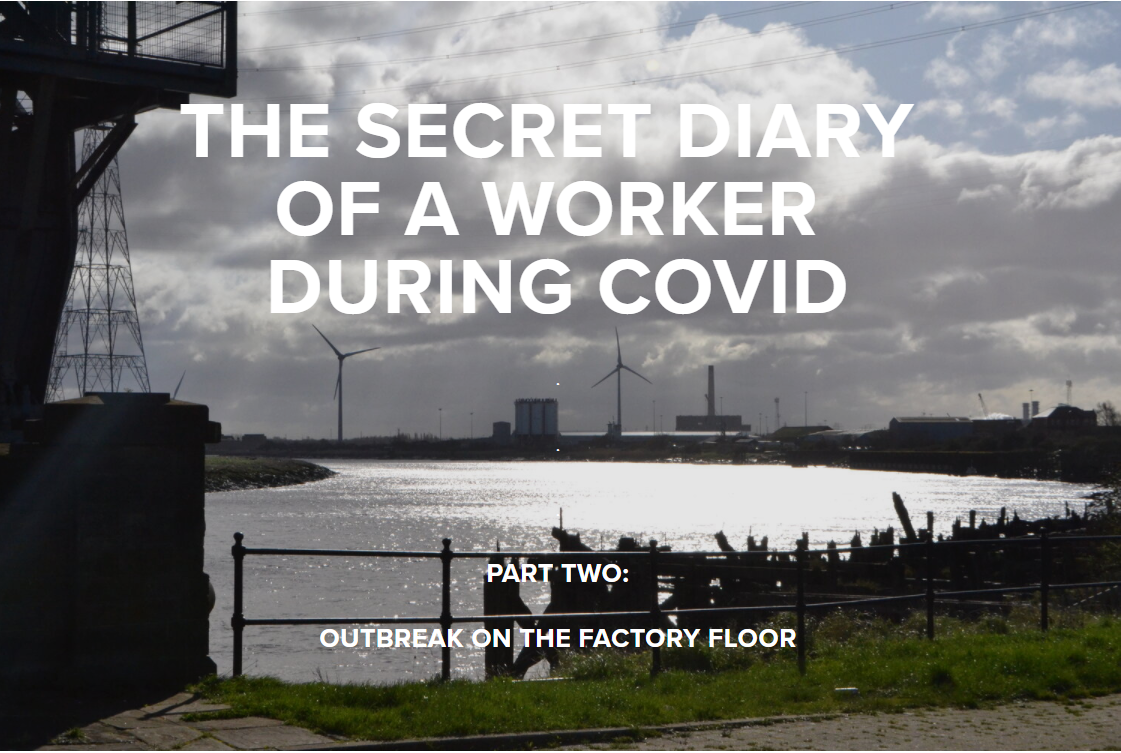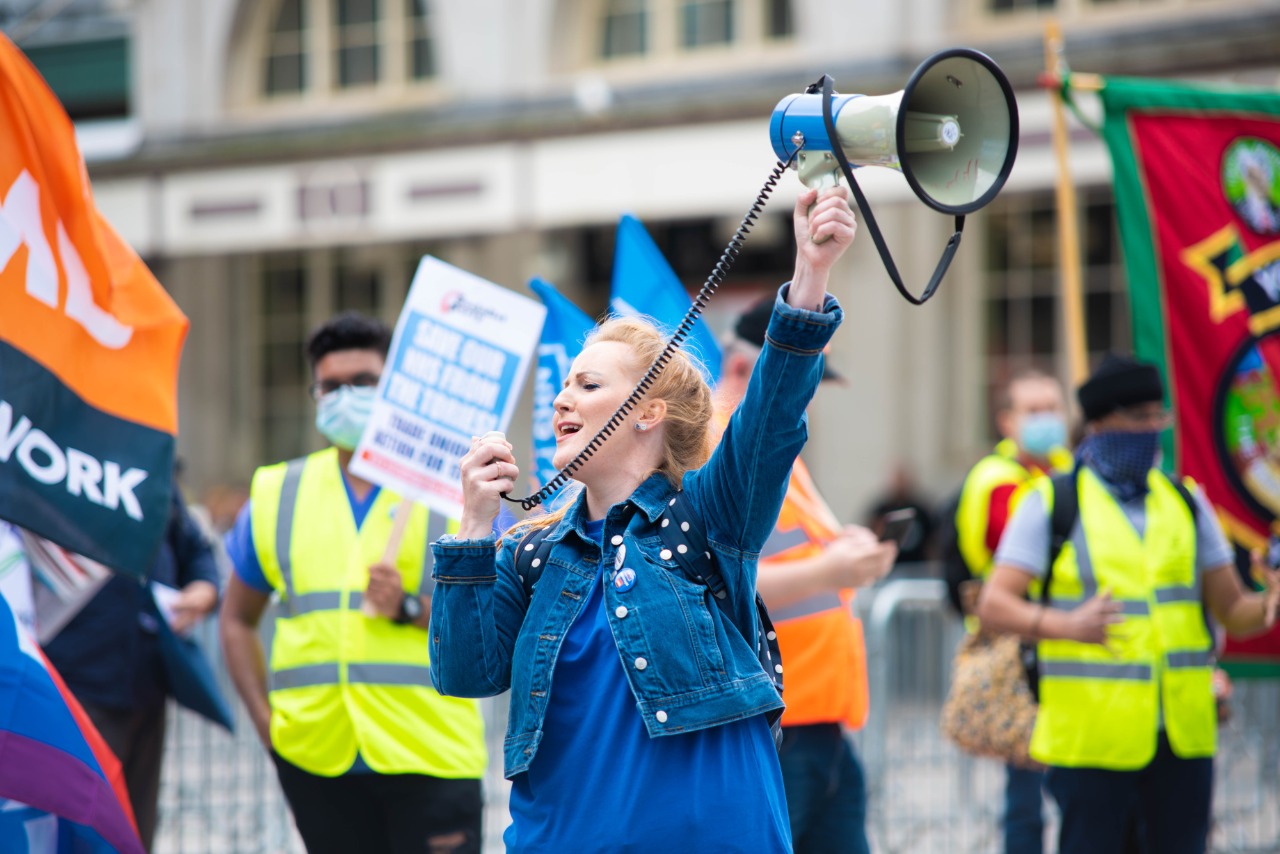
“There’s A Lot of Anger” – Health Workers Prepare For Historic Strike
Low morale, chronic staff shortages and nurses driven to tears… all for a pay rise of just 72p an hour. Why NHS workers are turning to strike action as the only way forward. By Adwitiya Pal
Main image: A Royal College of Nursing banner outside University Hospital Wales, Cardiff. By Adwitiya Pal
It was 12:30 AM on a Friday night at the end of October, and Naomi Gordon was making sure she had done everything to look after the patients in her ward. Her shift was supposed to end at noon – over 12 hours earlier – but she was still toiling away at the hospital on an 18-hour shift, with little thought for her own health and well-being.
This wasn’t even the first instance of her working so much overtime. “Most nurses are frequently doing 12, even 16-hour shifts,” says Naomi, a qualified nurse working in acute medicine and intensive care for the last six years in South Wales. “We are constantly criticised and our worth is not being recognised. There’s no incentive for staff to continue working like this.”
Even on the day we spoke, she had a day off but was still constantly engaged in calls to sort out issues at work. “Sometimes I’m unable to function after my shifts because it’s so tiring,” she says. “It takes a toll. At the end of the day, it feels like we’re not being valued, let alone as professionals but also as people.”
Adverse working conditions like these and inadequate pay for health workers’ effort has now boiled over. Most major unions in the NHS, representing staff such as nurses, physiotherapists, paramedics, cleaners, porters and midwives are balloting their members for strike action in Wales.
The Royal College of Nursing (RCN) was one of the first health unions to hold such a vote. When the ballot result came out last Wednesday, it showed nurses had voted to strike in the majority of Welsh hospitals. Now the union has given the Welsh and UK government an ultimatum: if a better deal isn’t forthcoming in 5 days time, walkouts will take place before Christmas
If they go ahead, it will be the first time that the RCN has gone on strike in its 106-year history, as inflation and the cost of living crisis have put nurses in an intolerable position. According to the union, an experienced nurse has seen their pay decline by at least 20%.
Nicky Hughes, Associate Director of Nursing at RCN Wales spoke to voice.wales about the result. “Our members are telling us ‘enough is enough’. They can’t carry out like this. They are stressed, burned out and exhausted.”
Speaking to RCN members amidst the ballots over the last few weeks, Nicky encountered several nurses telling her that they were the only person registered in their ward. “Nurses are leaving jobs because they can’t afford to be in this highly skilled profession anymore,” she says.
Besides the RCN, unions such as UNISON Cymru/Wales, Unite, GMB, the Royal College of Midwives and the Chartered Society of Physiotherapists are also currently holding sizable strike ballots to let health workers decide whether to walkout over pay.
The Welsh Government has offered a pay rise of £1,400, or just 72p an hour to health workers, amounting to a below-inflation average increase across the board.
Most unions, including RCN, are calling for a pay rise of approximately 17%, or 5% over the inflation rate, to help make up for 12 years of pay suppression.
UNISON, with around 350,000 NHS staff as members across the UK and 26,000 in Wales, launched its ballot on the 27th of October, sending out the papers in red envelopes to its members. The votes need to arrive before Friday 25th November, and the union is expected to release the results by the end of this month.
Hugh McDyer, Head of Health at UNISON Cymru/Wales, says that the response from the members has been overwhelming so far. He seems quite optimistic not only about the results, but also about successfully delivering industrial action in the Welsh NHS in order to help the staff sustain their living.
“Fully qualified nurses are coming to us and saying that they can’t afford to pay for heating in their houses and are having to rely on food banks to feed their families. We’ve even had people telling us they might have to sell their houses,” says Hugh. “1400 is just derisory, it’s an insult.”
This is a point backed up by nurse Naomi Gordon, who says that she was forced to look for a job closer to home as with the rising fuel prices, she couldn’t drive 40 minutes every day to work. “I’ve gone from putting £35 of fuel in my car to £70, and then I’m charged for parking. I’m losing more money than what I’m getting.”
A member of the Unite union, Naomi is looking forward to sending her vote of yes to strike action in Unite’s ballot, which opened on 7th November and closes on 30th November.
“No nurse ever wants to strike,” she tells me. “But it’s the last resort now. We are fighting for our profession and the safety of our patients, and we are determined to be heard.”
Meanwhile, GMB, the largest union in ambulance services, is also balloting its members for industrial action, with the votes closing on 29th November. Nathan Holman, who worked 24 years as a paramedic before joining GMB as its Regional Officer in Cardiff, says that workers cannot live on the wages that they’re being paid.
“People work within ambulance services because they love the job, they care about the people that they serve,” says Nathan. “But the pay and conditions are not letting them do that. They are overworked, the stress and anxiety levels within paramedics are very high, and they’re relying on handouts to survive. It’s demoralising.”
What’s exacerbating the situation is that the poor pay is forcing people to leave these jobs, contributing to the bare-bones workforce and piling up pressure on the remaining staff.
Tragically, the GMB union says that delays of up to 26 hours and over 100,000 vacancies in the NHS means that a third of its ambulance members think that a delay that they’ve been involved with has led to a death.
Similar staffing shortages are seen in the nursing sector too. There are currently 3000 vacancies in Wales, up from 1719 in 2021, with nurses working almost 70,000 additional hours.
Naomi says that the overworking is creating a sickening atmosphere in the wards, resulting in nurses being unable to function accurately and efficiently.
“Morale is on the floor. Staff are crying on shifts because they can’t cope with the workload. Nurses are falling sick because of this,” she says. “Some are even frightened to take in acutely unwell patients as they feel that they’re not going to be able to manage taking care of them.”
As a result, she stresses that striking is unlikely to further compromise the safety of the patients. “There’s no such thing as patient safety right now, because we’re not being given the resources or the time to look after them. If we do strike, at least resources are going to be made available for us to take care of the patients,” says Naomi.
Providing nurses with the conditions to take safe care of patients is a chief demand of the RCN’s strike, which could start as soon as December.
RCN members in all Welsh health boards bar one voted by a majority to strike. This includes the largest hospital in the country, University Hospital Wales in Cardiff.
However, the legal requirement for a minimum voter turnout of 50% is holding back strike action in the Aneurin Bevan University Health Board in South Wales. Despite over 90% of workers voting to strike, the minimum turnout threshold was missed by less than a dozen votes.
Other unions currently involved in balloting understand the necessity of getting a high voter turnout and are thus urging workers to post their votes as soon as possible. “We’ve got a battle on our hands to meet the government’s over 50% turnout in Wales. We are working very hard with our members to get their vote in our ballots,” says Hugh McDyer.
Hugh says that UNISON has been involved in detailed communication campaigns including phone calls, text messages, online meetings and social media outreach. “We’re doing everything you’d expect us to be doing,” he says.
Nathan Holman says that GMB has also been conducting similar programmes. One important thing that unions have been doing in the last few months in preparation for the ballots, he says, is educating workers about their right to strike and trying to get rid of the fear of taking industrial action.
“We’re informing our members that it is their right to strike. Not just that, but there will always be contingencies put in place to protect the most at risk. We will still be responding to emergency calls and agreeing to certain levels of A&E services,” he says.
Unions also want to make sure that the public realises the extent of the problems the NHS is facing, and who’s answerable for it.
According to Nathan, years of inadequate funding of the NHS by the Conservative-led UK Government is responsible for the situation today.
“For years and years we have been hearing the term efficiency savings,” he says, referring to the policy of getting more done with as few resources as possible. “In reality, there are no efficiency savings. These are cutbacks. Services are having to be either withdrawn or delayed because there are no funds available to sustain them.”
Hugh McDyer echoes similar views, further emphasising the fact that even though health services are devolved in Wales, they still have to rely on Downing Street for funding.
“It’s painful to see almost 15 years of the Conservative Government’s deliberate policies of austerity. They are focused on looking after their friends in the private sector and have squandered tons of money on agency spending,” says Hugh.
While the UK Government is undermining the NHS by funnelling money to private agencies, Nicky Hughes of the RCN says that the Welsh Labour is also guilty of doing the same.
In 2021-22, NHS Wales spent £133.4 million on agency nursing, an increase of 41% on the previous year. This would have paid the salaries of 4,930 newly qualified nurses.
Nicky says that the RCN’s economic modelling suggests that the Senedd has the money in its budget to invest in NHS staff pay but chooses not to at the moment. “We do not accept the Welsh Government’s argument,” she says. “Our agency nurses are telling us that if wages were improved, they would come back to the NHS.”
This reaffirms the fear that many NHS staff are feeling at the moment, says Naomi Gordon. “The NHS is a fantastic organisation for our public, but they’re trying to dismantle it. They’re going to take it off us and privatise it if we don’t fight for it,” she says.
It remains to be seen if the rest of the unions succeed in getting a historic vote for industrial action in the NHS. If they do it will raise the prospect of the biggest strike in the history of the health service as unions could take action on the same day. It also comes at a time when hundreds of thousands of other workers move towards mass walkouts over pay and intolerable conditions.
Nurse Naomi says that the cost of living crisis has also put fuel on the fire, and health workers are past the point of return.
“There’s a lot of anger, a lot more talk about strikes in the workplace,” she says. “I’m feeling optimistic this time. I hope this is a wake-up call for the government to recognise our worth.”


